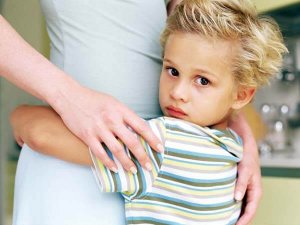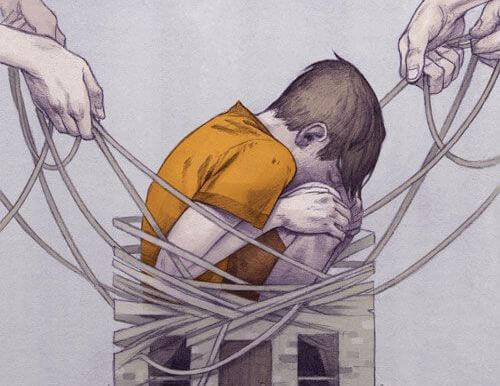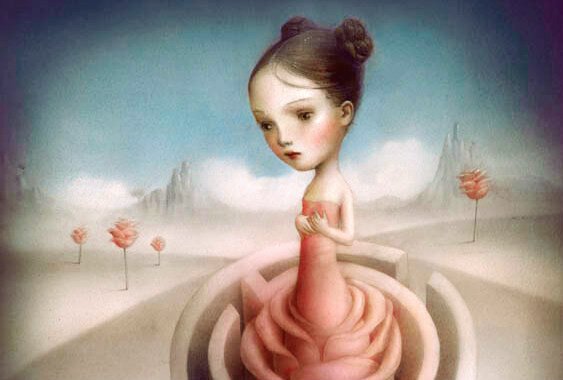The Aftermath of Overprotection

We must not confuse protection with overprotection. Protecting our children is vital for them. When they are small they need us and depend on us for almost everything.
All animals instinctively protect and care for their young for a certain time. Then, once the offspring can fend for itself, it begins its journey in the world alone, shedding itself of its parents.
In the case of humans, this protection is prolonged. Not only that, many times this protection, which initially serves to take care of our children and keep them safe, can become something really harmful to their mental health. We are talking about overprotection.
We could say that overprotecting a child is going beyond satisfying their needs and basic care. It is thinking for the child, making decisions for the child, solving all the problems of the child. It’s living for the child instead of letting him or her develop the personal skills to function in the world.
They are the typical parents who repeat to their children all day: “Don’t do that, you might get hurt”, “You’re not going to sleep at your friend’s house because I don’t know that house,” “Don’t go on the excursion because the animals can be dangerous” and no and no and no. Logically, with this attitude we only instill fear in our child and the false idea that the world is a dangerous place.
On the other hand, these parents are very permissive in the sense that they usually do not set limits and clear rules that children understand and internalize. In addition to this, if the children violate those unclear rules, they do not establish defined consequences for fear of harm their children, when really the consequences serve to educate, not to harm.
Nor do they require any obligations or responsibilities of them, which they are capable of according to their age. Instead, they claim the child “doesn’t want to”, “can’t do it the right way” or “poor thing, they’re still very small.”
These are the dysfunctional beliefs of parents who exercise overprotection. They think that by overprotecting their children they will take care of their self-esteem. The belief is that they will be happy children because “they are not going to lack anything”.
What are the consequences of overprotection?
Fearful people
It makes sense. If we have spent life warning our children of absolutely all the “dangers”, as unlikely or insignificant they are, they will go through the world with fear of what “might happen”.
Also, if we have never given them the tools to know how to face and solve their problems by themselves, they will be unable to face them. They may even become dependent on someone to get them off the hook every time they are in a complicated situation.

Dependent people
As I mentioned in the previous point, if we do not teach them to make their own decisions, manage their own life or solve their problems, they will always depend on someone to do it.
This, in turn, creates self-esteem issues. If a person believes they can’t handle life on their own, they’ll believe they’re useless, always needing someone else by their side.
Low tolerance for frustration
Their parents have always made sure they did not suffer for anything or become frustrated when they didn’t get what they wanted by giving them everything they asked for. They have not learned to tolerate that things in life do not always go as one would like.
Under the shelter of a family that practices overprotection, the child feels they have everything and that parents are some sort of servants that are at their feet when they need.
But sooner or later, life and society will tell them that this is not so, and that there are things that will hurt us and will inevitably cause us frustration. They will most likely to react to frustration with anger and even aggression.
Lack of development of personal skills
If we do not let our children make mistakes in order to learn and if we do everything for them, we are capping their ability to learn.

If we do not let them fall, they will never learn how to get up. People learn by negative and positive consequences of actions, so children need to experience the world to learn to cope better in the future.
As I always say, everything you learn, you also unlearn and that’s the positive thing. If you were overprotected as a child, it is your responsibility to reeducate yourself to grow as a person and to improve.
And if you are a parent who has just identified with this article, you still have time to change your mind if you want to help your child become an autonomous, independent and happy person. Not employing overprotection is the best gift you can give.
12 Ways To Promote Children’s Self-esteem
We want kids who want and trust in themselves and their potential. To do this, we provide the keys to building self-esteem … More »
This text is provided for informational purposes only and does not replace consultation with a professional. If in doubt, consult your specialist.








